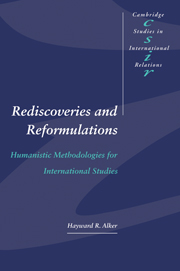Book contents
- Frontmatter
- Contents
- List of figures
- List of tables
- Acknowledgments
- Introduction: Voyages of rediscovery
- Part I Recovering Western antiquity
- Part II The humanistic science of the modern classics
- 4 The humanistic moment in International Studies: Reflections on Machiavelli and Las Casas
- 5 Can the end of power politics be part of the concepts with which its story is told? A Leibnizian reply
- 6 Rescuing “reason” from the “rationalists”: Reading Vico, Marx and Weber as reflective institutionalists
- 7 An Orwellian Lasswell: Humanistic scientist
- Part III Contemporary humanistic reformulations
- References
- Index
- CAMBRIDGE STUDIES IN INTERNATIONAL RELATIONS
7 - An Orwellian Lasswell: Humanistic scientist
Published online by Cambridge University Press: 13 January 2010
- Frontmatter
- Contents
- List of figures
- List of tables
- Acknowledgments
- Introduction: Voyages of rediscovery
- Part I Recovering Western antiquity
- Part II The humanistic science of the modern classics
- 4 The humanistic moment in International Studies: Reflections on Machiavelli and Las Casas
- 5 Can the end of power politics be part of the concepts with which its story is told? A Leibnizian reply
- 6 Rescuing “reason” from the “rationalists”: Reading Vico, Marx and Weber as reflective institutionalists
- 7 An Orwellian Lasswell: Humanistic scientist
- Part III Contemporary humanistic reformulations
- References
- Index
- CAMBRIDGE STUDIES IN INTERNATIONAL RELATIONS
Summary
First published in a volume focusing on the broader thematic relevance of George Orwell's 1984, this chapter is, perhaps surprisingly, about Harold Lasswell. For most readers, Harold Lasswell is probably but a shadowy figure from the “distant past” of American Political Science – one might recall an association with Merriam at Chicago in the 1930s; some catchy titles like Politics: Who Gets What, When and How; some crude operational studies of propaganda content; his commitment to the policy sciences; or the jargon-filled years of the Yale Law School and his coauthorship with Myres McDougall and others of numerous, weighty tomes on international law. But I consider Harold Lasswell to be the most important “founding father” of American Political Science in the twentieth century, the professional contemporary whose work most closely rivals and complements Orwell's achievements, and a shining, if neglected, model for further critical studies of systems of international domination; so I write about him here.
The Lasswell you will read about, then, will not be the person who directly influenced a whole generation of my teachers – themselves influential scholars like Gabriel Almond, Robert Dahl, Karl Deutsch, Heinz Eulau, Robert Lane, Daniel Lerner, Ithiel Pool, and Lucian Pye; it will be my personal Lasswell. This chapter pays homage to a great teacher from one of his later students. Focusing on an especially appropriate, but independently developed, theme it tries to present an Orwellian Lasswell for 1984 and beyond.
- Type
- Chapter
- Information
- Rediscoveries and ReformulationsHumanistic Methodologies for International Studies, pp. 238 - 264Publisher: Cambridge University PressPrint publication year: 1996

